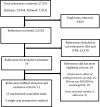Effect of Antihypertensive Medications on the Severity of Obstructive Sleep Apnea: A Systematic Review and Meta-Analysis
- PMID: 27397663
- PMCID: PMC4957192
- DOI: 10.5664/jcsm.6054
Effect of Antihypertensive Medications on the Severity of Obstructive Sleep Apnea: A Systematic Review and Meta-Analysis
Abstract
Study objectives: Obstructive sleep apnea (OSA) is an independent risk factor for hypertension (HTN). Increasing evidence from animal and human studies suggests that HTN exacerbates OSA. We performed a systematic review and meta-analysis of studies evaluating the effect of anti-hypertensive medications on the severity of OSA.
Methods: A literature search of PubMed and Embase was done using search concepts of OSA, HTN, and drug classes used to treat HTN. Studies that reported changes in the severity of OSA objectively by using apnea-hypopnea index (AHI) or respiratory disturbance index (RDI) were included. Pooled mean difference estimates were calculated. Tests for heterogeneity, publication bias, and subgroup sensitivity analysis were conducted.
Results: Of 27,376 studies screened, only 11 met inclusion criteria, including 5 randomized controlled trials and 6 single-arm prospective trials. The pooled mean difference estimate (95% confidence interval [CI]), based on a random-effects model, was -5.69 (95% CI -10.74 to -0.65), consistent with an overall decrease in AHI or RDI attributable to antihypertensive medications. The effect size was even more pronounced, -14.52 (95% CI -25.65 to -3.39), when only studies using diuretics were analyzed. There was no significant heterogeneity or publication bias among the studies. Meta-regression indicated neither age, baseline AHI, nor change in systolic/diastolic blood pressure influenced the results.
Conclusions: Collectively, findings from these relatively small, short-term studies tend to support the contention that treatment with antihypertensive agents confers a statistically significant, albeit small, reduction in the severity of OSA, which may be more pronounced with the use of diuretics.
Keywords: antihypertensive medications; hypertension; obstructive sleep apnea.
© 2016 American Academy of Sleep Medicine.
Figures



References
-
- Somers VK, White DP, Amin R, et al. Sleep apnea and cardiovascular disease: an American Heart Association/american College Of Cardiology Foundation Scientific Statement from the American Heart Association Council for High Blood Pressure Research Professional Education Committee, Council on Clinical Cardiology, Stroke Council, and Council On Cardiovascular Nursing. In collaboration with the National Heart, Lung, and Blood Institute National Center on Sleep Disorders Research (National Institutes of Health) Circulation. 2008;118:1080–111. - PubMed
-
- Cutler JA, Sorlie PD, Wolz M, Thom T, Fields LE, Roccella EJ. Trends in hypertension prevalence, awareness, treatment, and control rates in United States adults between 1988-1994 and 1999-2004. Hypertension. 2008;52:818–27. - PubMed
-
- Lewington S, Clarke R, Qizilbash N, Peto R, Collins R. Age-specific relevance of usual blood pressure to vascular mortality: a meta-analysis of individual data for one million adults in 61 prospective studies. Lancet. 2002;360:1903–13. - PubMed
-
- Nieto FJ, Young TB, Lind BK, et al. Association of sleep-disordered breathing, sleep apnea, and hypertension in a large community-based study. Sleep Heart Health Study. JAMA. 2000;283:1829–36. - PubMed
-
- Grote L, Wutkewicz K, Knaack L, Ploch T, Hedner J, Peter JH. Association between blood pressure reduction with antihypertensive treatment and sleep apnea activity. Am J Hypertens. 2000;13:1280–7. - PubMed
Publication types
MeSH terms
Substances
Grants and funding
LinkOut - more resources
Full Text Sources
Other Literature Sources
Medical
Miscellaneous

